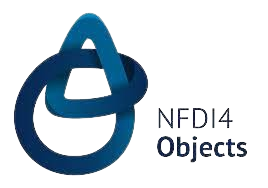Propylaeum & NFDI4Objects
As one of Propylaeum's supporting libraries, Heidelberg University Library has been a participant in the NFDI4Objects consortium, part of the National Research Data Infrastructure (NFDI) funded by the German Research Foundation, since 2023. The NFDI aims to systematically catalogue, sustainably secure and make accessible the data resources of science and research and to network them (inter)nationally. It is being set up in a process driven by the scientific community as a networked structure of consortia acting on their own initiative.
The DFG-funded specialised information services (FIDs) are important partners in the cooperation network for the development of a national research data infrastructure. They provide a powerful information structure for their respective subject communities and are actively involved in the strategic and planning processes of the NFDI consortia, in particular due to their many years of experience and their anchoring within their disciplines.
As part of the NFDI4Objects consortium, which is aimed at researchers and practitioners whose work focuses on the material heritage of around three million years of human and environmental history, Propylaeum is actively involved in Task Area 5 (Storage, Access and Dissemination), which provides comprehensive technologies and standards for the long-term archiving of research data and all other aspects of the FAIR principles:
Findable
Accessible
Interoperable
Reusable
What does Propylaeum offer as part of NFDI4Objects?
One of Propylaeum's tasks is to contribute to the further development of the service portfolio of Task Area 5. Accordingly, the collaboration will focus on analysing, establishing and further developing consulting and training services in the field of ‘publication and long-term archiving’, e.g. in the form of individual consultations, roadshows or webinars.
At the same time, Propylaeum offers various forms of publication in the field of e-publishing for the research data infrastructure in order to publish research data generated during an excavation:
The publications are archived permanently and citable with standardised addresses (URN, DOI) and metadata. They can be searched worldwide in various library catalogues and search engines. All publications are subject to a Creative Commons licence (CC licence).
In addition to the ‘classic’ PDF, xml-based publication is also possible. More information can be found here.
In addition, the research data can be archived in Propylaeum@heiDATA and provided with metadata. You can find an example here.
Who can use Propylaeum?
All researchers and practitioners at all career levels in the field of archaeology (state heritage offices, excavation companies, institutes, etc.) who would like to publish their research data online, quickly and accessibly.
If you are interested, please contact us!
Joint Propylaeum and NFDI4Objects workshop ‘Aus der Erde ins Netz’, 20 November 2024, online, more information here.



